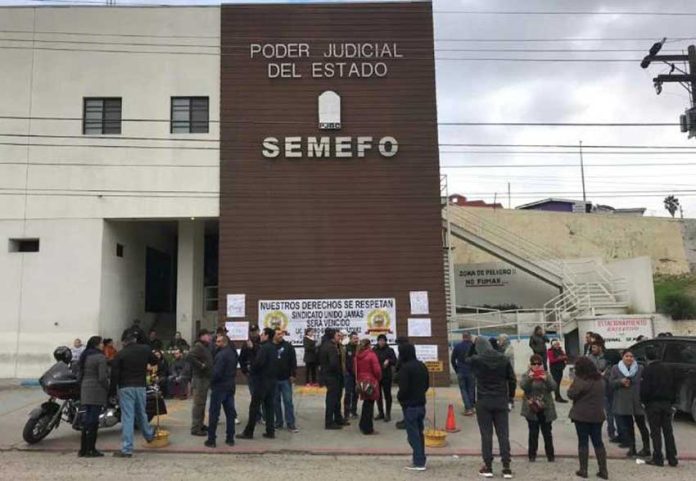A photograph shows a pile of naked and bloody dead bodies: belly-up, their legs contorted and tangled together, they lie discarded on two sheets, one red and one white.
The disturbing image is not from an extermination camp in 1940s Nazi Germany – it shows the reality of a Tijuana morgue.
The image, which was taken on a cell phone and circulated on messaging service WhatsApp, is real and no more than two months old, morgue employee Nicandro (not his real name) told the newspaper El Universal.
“It occurred for two reasons, the Attorney General’s office took too long to discharge the bodies [and] Semefo [the Forensic Medical Service, which operates the morgue] doesn’t have the capacity to store so many bodies,” he said.
There were 2,518 homicides in Tijuana in 2018, according to local authorities, making the northern border city Mexico’s new murder capital.
Violence in the city overwhelmed authorities to such an extent that they entered into agreements with private companies, such as funeral homes, to have them pick up bodies from crime scenes and transport them to the Tijuana morgue.
And the bodies kept coming and coming.
On average, 350 corpses arrive at the Tijuana morgue each month yet it only has the capacity to store 150.
But not only is there not enough space at the morgue, its employees often lack basic equipment with which to receive the ever-growing number of bodies.
“Sometimes, the [private company] colleagues arrive and they come in to help us . . . They lend us gloves because we don’t even have those . . .” Nicandro said. And at times they have no money either.
He explained that the state government failed to pay employees of the Attorney General’s office their monthly salaries for December as well as end-of-year bonuses until this week and only after workers went on a partial strike.
Problems at the Tijuana morgue are not new.
In December 2017, the Federal Environmental Protection Agency (Profepa) threatened to shut it down after it was discovered that it was storing blood, body fluids and other medical waste in its parking lot.
Over a year later, a lack of refrigerated space means that offensive smells in and around the two-story building are constant.
“It smells bad but it’s normal, it’s like a mechanics’ workshop, what does it smell of? Oil, right? If there are dead people here, what do you think it’s going to smell of?” a morgue worker commented.
The smell, Nicandro said, is something that all the morgue employees carry with them after they leave work because “that’s the way it is if there are not enough fridges . . .there’s no way to cover up the problem.”
On at least two occasions, he has been asked to get out of a taxi in which he was traveling because, according to the drivers, he carried with him the stench of death.
“Even your family tells you that,” Nicandro quipped.
Source: El Universal (sp)
